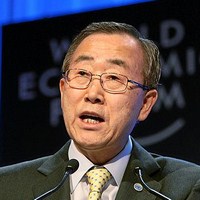Last week, former British Foreign Secretary David Miliband announced plans to move to New York to head the International Rescue Committee, a leading humanitarian organization. In his new position, Miliband is likely to be a powerful voice in debates over crises such as that in Syria. His decision may have inspired some envy at the United Nations, which would benefit from the services of such a seasoned political operator. U.N. officials are already starting to size up early candidates to replace Ban Ki-moon as secretary-general in 2017. The next leader of the U.N. is likely to be a European. But he or she may lack Miliband’s stature.
The battle to succeed Ban could turn nasty, pitting Western-backed candidates against alternatives favored by Russia. If that sounds like a return to the Cold War, it’s because the U.N. has never fully shrugged off the old East-West divide. There’s an unwritten rule that the post of secretary-general should rotate between different regions. Since World War II, three Europeans, two Asians, two Africans and one Latin American have held the office. But, in an anomaly dating back to the days of the Iron Curtain, the U.N. treats Eastern Europe as a distinct region. And no Eastern European has been secretary-general.
When Ban ran for office in 2006 against a variety of other Asian politicians, one Eastern European candidate, former Latvian President Vaira Vike-Freiberga, made a bid and performed fairly well. Now there seems to be a general diplomatic consensus that in 2017, Eastern Europe’s turn will come at last.

